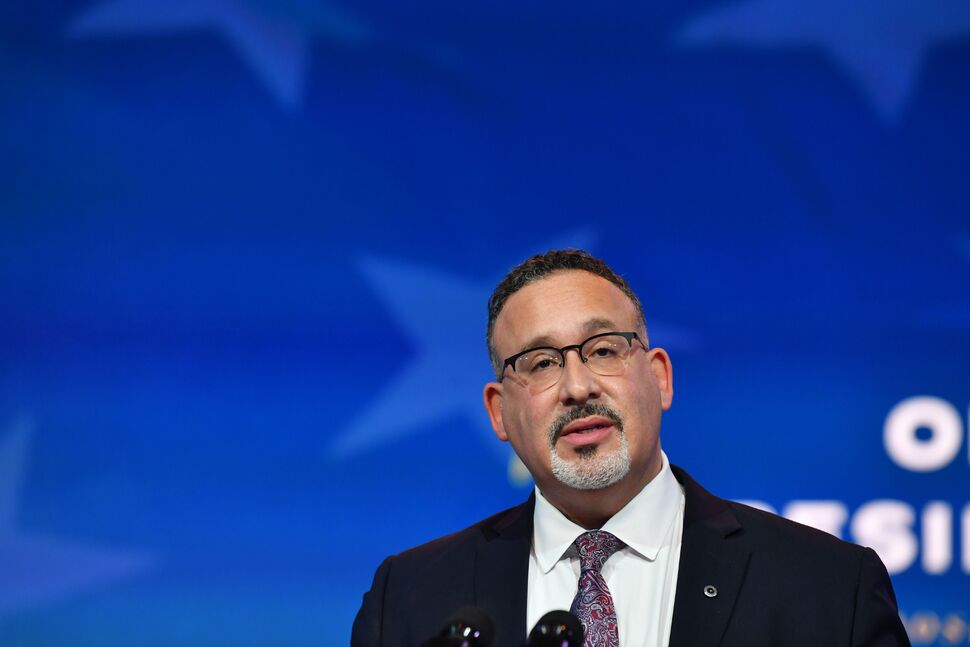Schools would violate the new Title IX regulations if they categorically ban transgender students from sports teams but may adopt policies that limit participation in specific instances.
Education Department officials walked a tightrope in crafting the Biden administration’s new Title IX regulations, leaving wiggle room for school and college administrators to limit the participation of transgender students from playing on sports teams that match their gender identity while also barred outright bans against the practice.Schools and colleges would not be permitted to prohibit transgender athletes – a major blow to the slate of Republican-controlled states that have passed laws over the last two years doing just that – but could prevent participation on a case-by-case basis, including in highly competitive settings like high school or college athletics.
“Every student should be able to have the full experience of attending school in America, including participating in athletics, free from discrimination,” Education Secretary Miguel Cardona said in a statement. “Being on a sports team is an important part of the school experience for students of all ages.”
“Beyond all the benefits to physical and mental health, playing on a team teaches students how to work hard, get along with others, believe in themselves, and build healthy habits that last a lifetime,” he said. “Today’s proposed rule is designed to support Title IX’s protection for equal athletics opportunity.”
The proposed regulation is just one sentence long:
“If a recipient adopts or applies sex-related criteria that would limit or deny a student’s eligibility to participate on a male or female team consistent with their gender identity, such criteria must, for each sport, level of competition, and grade or education level: (i) be substantially related to the achievement of an important educational objective, and (ii) minimize harms to students whose opportunity to participate on a male or female team consistent with their gender identity would be limited or denied.”
In breaking the changes down for reporters on Thursday, a senior department official said that policies would violate Title IX if they categorically ban transgender students from participating on sports teams consistent with their gender identity, and would not be permitted to adopt or apply such one-size-fits-all policies.
But in heeding concerns from stakeholders about how some transgender students’ participation may give teams unfair advantages, the proposed rule also recognizes that in some instances – particularly in competitive high school and college athletic environments – schools may adopt policies that limit the participation of transgender students.
Moreover, a senior department official said, the proposed rule would provide schools with a framework for developing eligibility criteria that protects students from being denied equal athletic opportunity, while giving schools the flexibility to develop their own participation policies.
Some of the flexibility includes criteria such as ensuring fairness in competition, grade level or preventing sports-related injuries, and would be sport-specific and specific to the level of competition.
It remains unclear, however, exactly how the regulation, if adopted as is, would play out in the real world.
The senior department official offered, for example, that under the proposed regulation, elementary school students would generally be able to participate on school sports teams consistent with their gender identity and that it would be particularly difficult for a school to justify excluding students immediately following elementary school from participating consistent with their gender identity. But for older students, especially at the high school and college level, the department expects that sex-related criteria that limit participation of some transgender students may be permitted.
The proposal is unlikely to fully satisfy either camp.
“The Biden Administration is trying to have their cake and eat it too: inject gender identity into athletics while placing the onus upon school districts to determine whether doing so would be problematic or not,” said Nicole Neily, president and founder of Parents Defending Education, a group that opposes allowing transgender students to participate in sports.
“Without a doubt, institutions are going to err on the side of inclusion, because they fear the wrath of the Education Department,” she said. “Thus, achieving the Department’s end goal while allowing them to maintain plausible deniability that they coerced districts into doing so.“
Meanwhile, civil rights and LGBTQ advocacy groups applauded the administration for addressing the issue in Title IX but underscored any final rule should be more robust in its protections for transgender students.
“We are grateful for the actions the Department of Education has taken to protect trans students and are ready to work to ensure that a final rule builds to further fight back against discrimination and misinformation, making crystal clear that trans, nonbinary, and intersex students are entitled to support, respect, and equal rights and opportunity,” said Fatima Goss Graves, the president and CEO of the National Women’s Law Center.
The proposed regulation has been in the works for more than two years now, and comes as 20 states currently bar transgender girls and women from participating in K-12 or college sports. Kansas joined that list on Wednesday when its Republican legislature overrode Democratic Gov. Laura Kelly’s third veto in three years of the measure.
It’s estimated that less than half of one percent of high school athletes are transgender and that roughly 30 transgender athletes compete openly in college sports.
Notably, the proposed regulation was released just hours before the Supreme Court ruled that West Virginia cannot enforce its sports ban on transgender athletes, allowing a 12-year-old transgender girl to continue competing on her track and cross-country teams.
In drafting the proposed regulation the Education Department received over 280 live comments and over 30,000 written comments. The regulation will be open for public comment for 30 days, and department officials expect it to be finalized in May.

